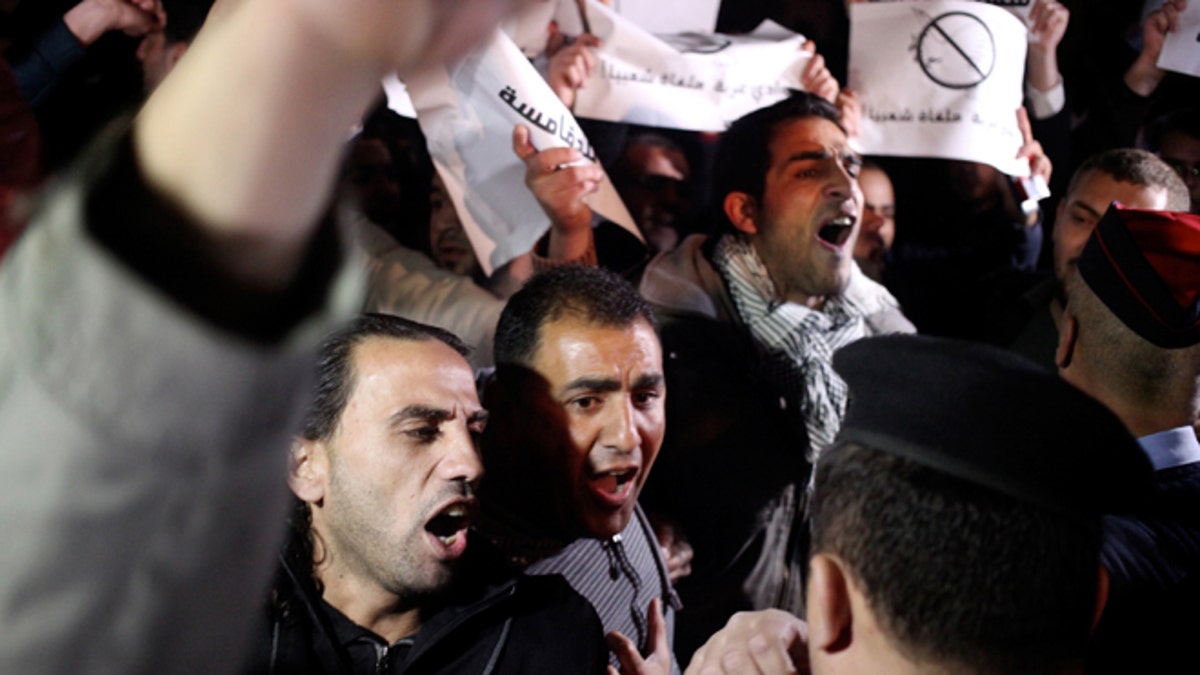
Mar. 10, 2014: Jordanian protesters shout slogans across the street from the Israeli embassy and demand the deportation of the Israeli ambassador after the killing of Jordanian judge Raed Zueter, 38, at Allenby crossing between Jordan and the West Bank, in Amman, Jordan. (AP)
JERUSALEM – Israel's prime minister on Tuesday expressed sorrow over the fatal shooting of a Jordanian judge and announced a joint investigation into the incident, seeking to ease tensions with its key Arab ally.
The statement of regret by Prime Minister Benjamin Netanyahu reflected the importance that Israel places on its relations with Jordan, one of just two Arab countries that have peace agreements with Israel. The two countries signed their peace deal in 1994 and maintain strong security ties.
The death of Raed Zueter, a Jordanian magistrate of Palestinian descent, has caused an uproar in Jordan, triggering street protests and calls in parliament to annul the 1994 peace agreement with Israel.
The Israeli military said that guards shot Zueter on Monday after he tried to grab a rifle from a soldier at the border crossing between the West Bank and Jordan. Zueter, who is originally from the West Bank city of Nablus, had been visiting relatives there and was on his way back to Jordan at the time.
The military said an initial investigation found that Zueter attacked a soldier while shouting "Allahu Akbar," Arabic for "God is Great," and the soldiers were forced to open fire, first at his legs and then at his body after he began to strangle a soldier.
In Nablus, about 1,000 people attended Zueter's funeral. The Palestinian Authority escorted the body in a 20-vehicle military procession. As the convoy snaked through the streets, mourners shouted and chanted anti-Israel slogans.
About half of Jordan's population is Palestinian, and public sentiment toward Israel is often hostile.
In a statement, Netanyahu's office said, "Israel regrets the death of Judge Raed Zueter... and expresses its sympathies to the people and government of Jordan."
It said Israel had shared the results of its preliminary investigation with Jordan, and agreed to a Jordanian request to establish a joint investigation immediately.
In Amman, the Jordanian parliament discussed the killing on Tuesday. Prime Minister Abdullah Ensour said the government condemned the killing and said that Israel had apologized.
Lawmakers mocked and dismissed the Israeli gesture, and the parliament speaker, Attef al-Tarwaneh, said the shooting was a violation of the peace treaty. During the discussion, a spectator was escorted outside of the building after trying to set fire to an Israeli flag.
Dozens of protesters gathered outside the parliament afternoon for a second day of protests against Israel. Meanwhile, hundreds of lawyers and judges staged a one-day strike, calling on Jordan to deport the Israeli ambassador and cancel the peace treaty.
About 150 angry Jordanian protesters gathered on Monday near the Israeli Embassy to condemn the killing. Security forces dispersed the demonstration after protesters tried to attack the embassy.
A mass protest against Israel is expected after Friday noon prayers organized by opposition parties.
